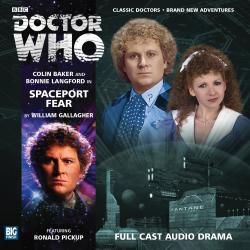
Spaceport Fear
Big Finish Productions
Written by William Gallagher
Directed by: Barnaby Edwards
Released February 2013
All is not well at Tantane Spaceport. The massive structure – a network of departure gates, hydroponic gardens, passenger lounges and maintenance tunnels – has been sealed off centuries. Outside, an endless storm rages. Inside, the spaceport’s surviving inhabitants have split into two warring tribes, Business and Economy, whose members mouth litanies and obey traditions handed down over 19 generations. Into this hermetically sealed environment come the Sixth Doctor (Colin Baker) and Mel (Bonnie Langford), and trouble isn’t far behind them.
The Plot:
Having turned 20 years of age, novitiate Naysmith (Isabel Fay) comes to the place of tradition – Customs – to attest that she, like those who came before her, has learned the rites and rituals of Economy. "I travel light. I have learned to live on little liquids," she proclaims. Soon, however, Naysmith’s initiation – and the lives of her boyfriend, Pretty Swanson (Gwilym Lee) and his mother Beauty (Big Finish regular Beth Chalmers) are disrupted by an unexpected arrival.Landing in Tantane Spaceport, the TARDIS activates the base’s sleeping computers, triggering mechanisms across the complex, including the lights – a process that the locals, used to near-permanent darkness, call ‘summer’. Part of the station’s rebooting process sees its walls rearrange themselves for no readily apparent reason, other than being a handy plot device to swiftly separate Mel and the Doctor from the TARDIS – a somewhat artificial means of engaging them with the adventure, it must be said, but an effective one.
Roaming the spaceport’s corridors, the travellers encounter Naysmith and her clan, as well as their sworn enemies from Business, the gruff Galpan (Chalmers again) and her subordinate, the trigger-happy Rogers (Adrian MacKinder). Then there’s Economy’s spiritual leader, Elder Bones (Ronald Pickup), who claims to have overseen the tribe’s welfare for almost 500 years – a task which includes warding off the Wailer, a savage beast normally confined in a remote section of the spaceport. Unfortunately, the arrival of summer, and the spaceport’s shifting walls, seem to have set the Wailer free.
The Doctor and Mel must now navigate the shifting corridors and make their way to the control tower in order to find and access the TARDIS, while avoiding the laser-blasts of Business and the claws of the Wailer. Simultaneously, they have to keep everyone else safe – and then there’s the small matter of the raging storm outside…
Observations:
Writer William Gallagher has woven together a number of well-established Doctor Who tropes in his third story for Big Finish (following the short Fifth Doctor story Doing Time on The Demons of Red Lodge and Other Stories and Sixth Doctor adventure Wirrin Isle). There’s a great deal of running down corridors here, as well as dramatic use of conduits and air-conditioning vents; a base under siege and a monster on the loose inside its confined spaces; but the most familiar motif in Gallagher’s script is of the devolved society, as seen in a number of televised stories including Season Three’s The Savages, Season Eight’s Colony in Space, Season 18’s State of Decay and Season 24’s Paradise Towers. Perhaps the most famous example of devolution in Doctor Who is Season 14’s The Face of Evil, and it’s this story that most springs to mind when listening to Spaceport Fear – indeed, Gallagher himself references it in the interviews which appear as extras on disc two. But unlike Chris Boucher’s classic Fourth Doctor story, in which the warring tribes of Sevateem and Tesh and their backstory are integral to the story, the origins of Tantane Spaceport’s rival tribes are less a key plot point and more local colour – albeit local colour that serve as a striking metaphor for contemporary western society and the growing gap between the haves and the have-nots.
Spaceport Fear is something of a homage to Boucher’s story but quite different in tone and intent. His dialogue, and the evocation of the world in which the characters live, is detailed and engaging, while the mood is light – not comical, but certainly less than entirely serious.
Unfortunately the story, too, is a little lacking in substance, with the third episode in particular feeling somewhat padded, though as a whole the adventure definitely entertains. Other flaws are evident: in the final act, Gallagher’s characters grasp the uses of advanced technology such as mechanised transport a bit too quickly given what we have previously learned about their society, while the revelation concerning the perfidy of a major character is rather obviously foreshadowed. Such flaws may be due to the story being rushed into production to fill a gap in the Big Finish schedule (as revealed in the story’s bonus features); more time in development might have helped craft a stronger narrative.
Other faults occur in production – Beth Chalmers tries her best to differentiate her two characters, but the presence of an additional actor would have greatly assisted proceedings – though as a whole, the story sounds excellent, particularly the sound design, which gives a strong sense of the scale of Tantane Spaceport. The chemistry between Baker and Langford sparkles, and Gallagher earns extra points for ensuring that Mel’s eidetic memory and affinity with computers are integral to the story.
